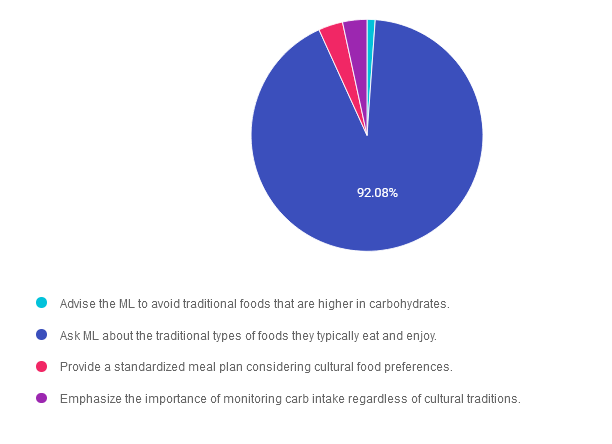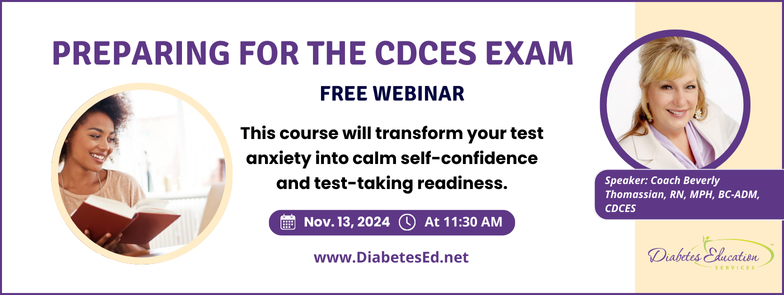For last week’s practice question, we quizzed participants on practicing cultural humility. 92% of respondents chose the best answer. We want to clarify and share this important information, so you can pass it on to people living with diabetes and your colleagues, plus prepare for exam success!
Before we start though, if you don’t want any spoilers and haven’t tried the question yet, you can answer it below: Answer Question

Question: You are caring for ML, a Latinx person with newly diagnosed diabetes about lifestyle modifications. ML mentions that traditional family dinners are a central part of their daily routine.
How can the educator apply cultural humility in their approach to diabetes education to support ML’s dietary needs and preferences?
Answer Choices:
- Advise the ML to avoid traditional foods that are higher in carbohydrates.
- Ask ML about the traditional types of foods they typically eat and enjoy.
- Provide a standardized meal plan considering cultural food preferences.
- Emphasize the importance of monitoring carb intake regardless of cultural traditions.

Getting to the Best Answer
Answer 1 is incorrect. 1.13% chose this answer. “Advise the ML to avoid traditional foods that are higher in carbohydrates.” This answer was obviously incorrect to the majority of you, which highlights your knowledge of cultural humility and person-centered care. Even though it is important to monitor carbohydrates, we can’t disregard their cultural traditions. By considering the importance of cultural humility and person-centered care, we can help individuals determine a meal planning approach that works for them.
Answer 2 is correct. 92.08% of you chose this answer. “Ask ML about the traditional types of foods they typically eat and enjoy.” Yes, one of the main tenants of MNT is to “maintain the pleasure of eating.” This BEST answer highlights the importance of cultural humility and person-centered care. By considering the importance of cultural humility and person-centered care, we can help individuals determine a meal planning approach that works for them. Great job!
Answer 3 is incorrect. About 3.40% of respondents chose this. “Provide a standardized meal plan considering cultural food preferences.” One of the main tenants of MNT, is that there is NO one standardized meal plan. Our goal is to create an individualized meal plan in collaboration with the individual, based on their values, needs and preferences. By considering the importance of cultural humility and person-centered care, we can help them determine a meal planning approach that works for them.
Finally, Answer 4 is incorrect. 3.40% chose this answer. “Emphasize the importance of monitoring carb intake regardless of cultural traditions.” Our goal is to create an individualized meal plan in collaboration with the individual, based on their values, needs and preferences. Even though it is important to monitor carbohydrates, we can’t disregard their cultural traditions. By considering the importance of cultural humility and person-centered care, we can help individuals determine a meal planning approach that works for them.
We hope you appreciate this week’s rationale! Thank you so much for taking the time to answer our Question of the Week and participate in this fun learning activity!
Want to learn more about this question?
Join us live on November 13, 11:30 am PST for our
FREE Prep for CDCES Exam Webinar

Join us to get ready to succeed a the CDCES Exam. This course will transform your test anxiety into calm self-confidence and test taking readiness. Topics covered include:
- Changes in requirements for 2024
- Exam eligibility and the updated test format
- Strategies to succeed
- Review of study tips and test taking tactics.
We will review sample test questions, and the reasoning behind choosing the right answers.
After registering, you will receive a confirmation email containing information about joining the webinar.
Intended Audience: This FREE webinar is designed for individual or groups of diabetes educators, including RNs, RDs, Pharmacists, Nurse Practitioners, Clinical Nurse Specialists, Physician Assistants and other health care providers interested in achieving excellence in diabetes care and becoming Certified Diabetes Care and Education Specialists®.
Instructor: Beverly Thomassian RN, MPH, CDCES, BC-ADM is a working educator who has passed her CDCES Exam 7 times. She is a nationally recognized diabetes expert for over 25 years.
Sign up for Diabetes Blog Bytes – we post weekly Blog Bytes that are informative and FREE! Every week we post one exam practice Question of the Week and Rationale of the Week. Sign up below!
All hours earned count toward your CDCES Accreditation Information
The use of DES products does not guarantee the successful passage of the certification exam. CBDCE and ADCES do not endorse any preparatory or review materials for the CDCES or BC-ADM exams, except for those published by CBDCE & ADCES.









